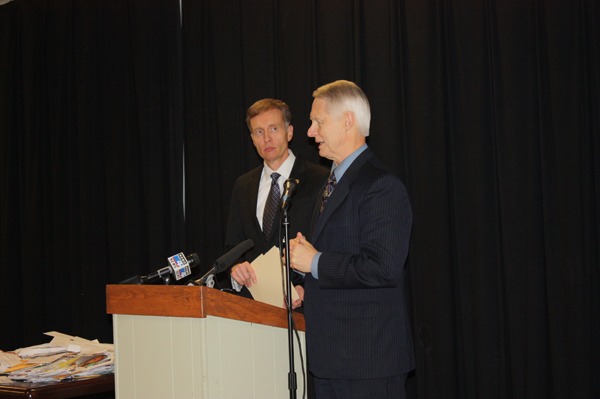Reed, McKenna team up to urge wise giving
Besides giving presents to family and friends during the holiday season, many show their generosity by giving money to charities.
Unfortunately, there are some Grinch-like groups that aim to take advantage of donors. So how do you avoid being a victim? Give wisely by doing your homework before you open your wallet or checkbook.
That was the message imparted by Secretary Reed and Attorney General Rob McKenna as they teamed up to unveil this year’s Commercial Fundraiser Activity Report at the Greenwood Senior Center in Seattle. Go here to view the full report and here to see the overview.
Commercial fundraisers are businesses that get paid to solicit donations. (That pile of solicitation letters in the photo was received by an elderly lady in Seattle over the past year.) The report shows how much money fundraising organizations pass on to intended charities and how much they keep as overhead.
The 2011 report shows that charities that used commercial fundraisers in Washington received 56 percent of the total donations raised by those fundraisers. It’s far below the 77 percent mark in 2010, but it’s a little higher than the average return rate over the years.
There are currently 9,684 charities registered in Washington State. Of those, 685 report using commercial fundraising services.
Info on the report for the past three years can be found here. The report is compiled annually by our Charities Program.
Reed and McKenna provided plenty of tips on how to give wisely and avoid getting scammed by greedy fundraisers:
• Learn as much as you can about the organization that has contacted you for a donation. Charities and commercial fundraisers have an obligation to provide detailed information to interested donors.
• Solicitors need to state their name, and the name of the charitable organization and its principal place of business. They also need to state the name of the commercial fundraiser, if any, that employers the solicitor.
• Request written material from the organization. Legitimate organizations welcome your interest and are happy to provide info. Be wary of those that don’t.
• Be wary if they offer to send someone to collect your donation right away.
• Don’t give in to high-pressure ‘hardball’ solicitations that demand an instant commitment. If the charity is legitimate, it should be willing to give you time to make up your mind.
• Don’t be fooled by a name. Some organizations use sympathetic sounding names, or names that closely resemble those of respected, legitimate charities.
